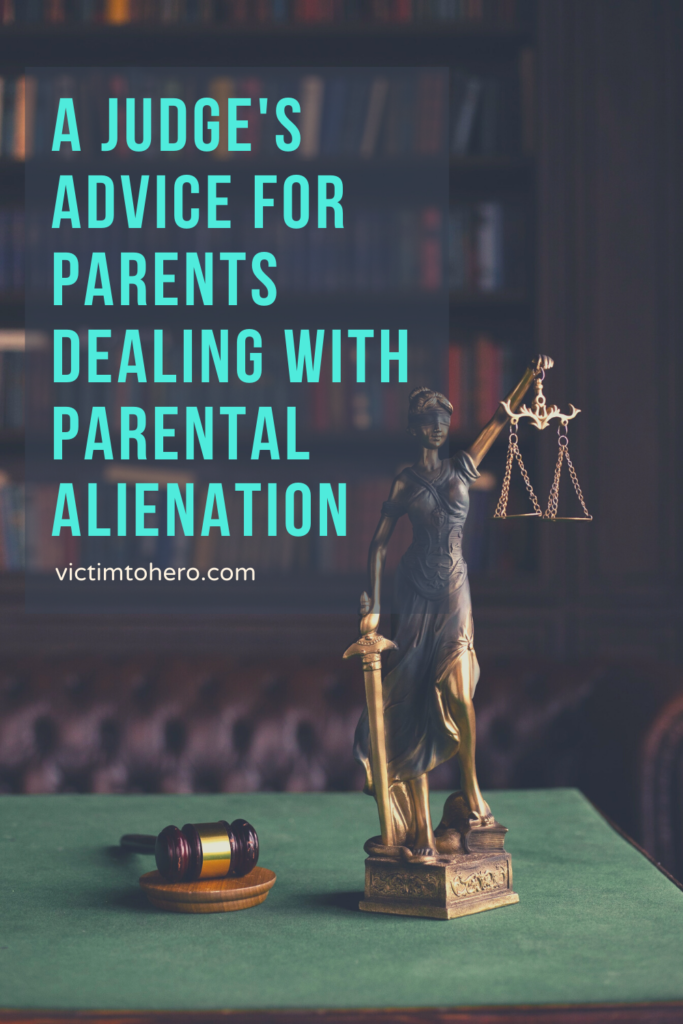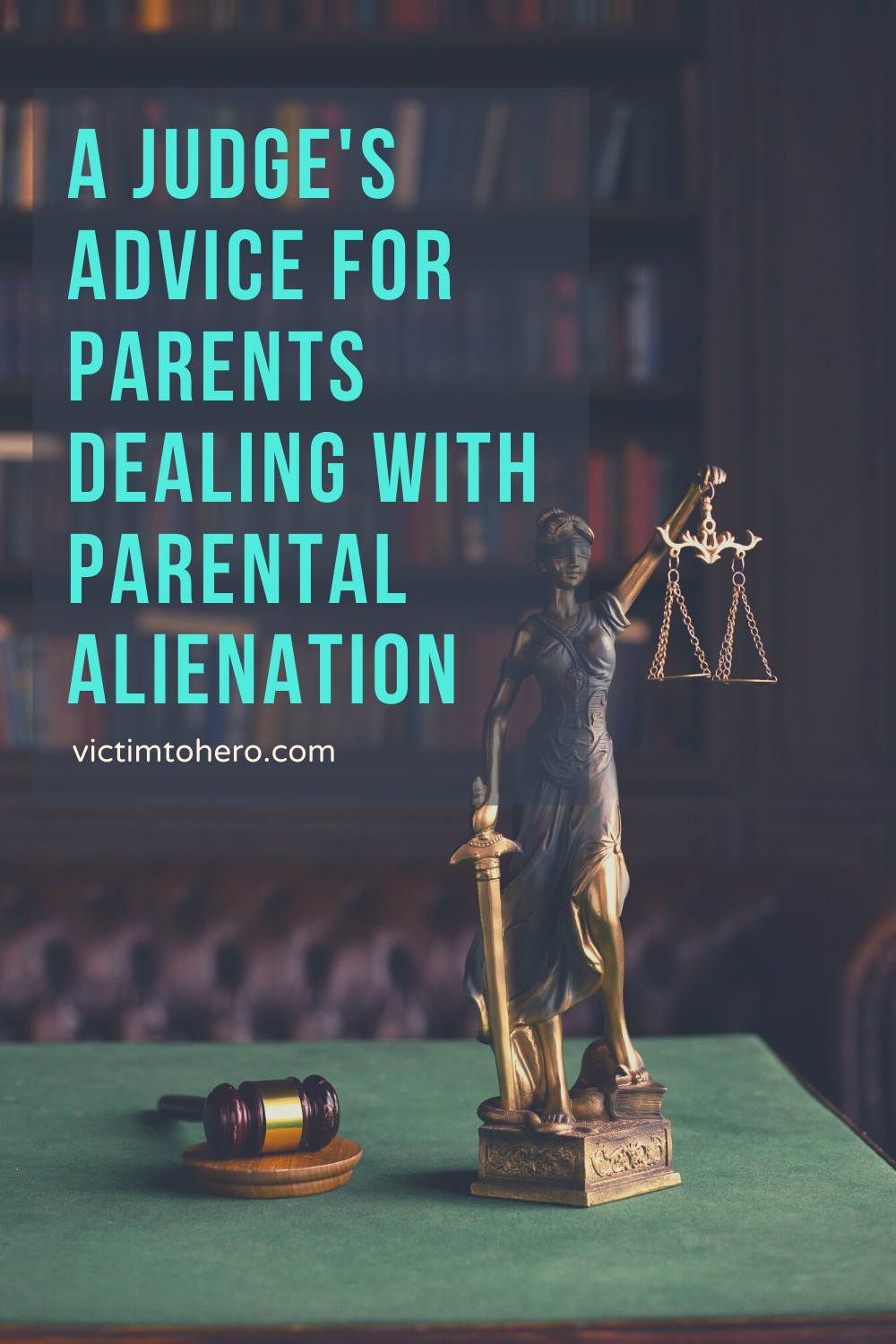This week we had the opportunity to ask a judge for advice for alienated parents. We have promised to post the interview anonymously but this is a judge who has seen, ruled parental alienation cases, and had held alienators accountable. Below is the interview.

Question: As a judge who has seen and ruled parental alienation cases in court, what types of mistakes you often see alienated parents make?
Answer:
First, the parent who claims that they are on the receiving end of parental alienation needs to engage in honest self-evaluation. In other words, is there a legitimate basis for which the other parent is concerned?
For example, is the “victim” parent subject to violent outbursts or verbal barrages for which a reasonable person, let alone a significant other, would be concerned about the victim parent’s parenting skills?
Another example may involve self-reflection for any substance abuse issue for which a reasonable person would be legitimately concerned? Where a parents had an alcohol/drug issue for years and was subject to rage, that the
parent has been sober for 90 days may not be enough time for which change is truly demonstrated.
This self-reflection or evaluation requires an honest evaluation of the facts and may require an honest dialogue with a reputable person or entity, not simply stating skewed “gripes” to biased friends or family members.
Second, if the victim parent is truly a victim parent, that parent must not engage in unreasonable conduct during the custody battle. It is not helpful for the victim parent to do the offending parent’s job by doing or saying things that do not advance the victim parent’s interests. Those
interests should be promoting a positive parent/child relationship with BOTH parents. In other words, the victim parent needs to suppress the natural desire to retaliate for any offensive comment or action. Being positive and loving to the children AND being positive and considerate to the offending parent speaks volumes of the victim parent’s character. That
behavior will, hopefully, be noticed by the court should there be a trial.
A benchmate recently approached me on this very topic and complained that the victim parent’s behavior (and his parent’s behavior—i.e. a grandparent)was doing more harm to the parent/child relationship because the victim parent felt the need to retaliate. Of course, the offending parent immediately advised the child of those actions and now the victim parent has actually harmed his position. Don’t allow friends/family members to add gasoline to the fire.
Question: What do you advise alienated parents to do or how they can best present/fight their cases?
Answer:
Initially, the victim parent must insist that any parenting time orders be enforced and followed. This may be particularly difficult if the offending parent has caused, or the child has made, false allegations of misconduct or sexual abuse. Obviously, allegations of sexual assault or molestation are taken seriously by the authorities and any such allegations routinely involve the suspension of parenting time. The victim parent should cooperate with the authorities during this process. Hopefully, the authorities are apt at spotting and eliminating obvious false allegations o misconduct. The victim parent should aggressively, through the legal process and with an attorney, appropriately challenge any false allegations.
Should the offending parent place additional roadblocks to parenting time, the victim parent should file the appropriate complaints to the entity responsible for parenting time enforcement or with the court. Courts are reluctant to impose non-monetary contempt sanctions for parenting time violations. But, in cases of alienation, incarceration may be required in order to ensure compliance with parenting time orders. In pursuing this process, it is important to have appropriate witnesses, including expert witnesses. Psychological evaluations and counseling records may prove beneficial in advancing the victim parent’s position.
Certainly, there is nothing magic in these comments. Nevertheless these comments may provide additional context and support for addressing this complicated issue. The nuts and bolts of this topic are case specific and require much analysis from the attorneys on how best to proceed.


That judge is one of the players in the charade of Family Court and best interest of the child. His/her recommendations keep the alienated parent in court spending money to support the player’s lifestyles. Do whatever it takes to stay out of and far away from family court. There is no way a loving caring healthy parent will benefit battling a narcissistic parent in court. Half the judges are narcissists. The unhealthy will only fight harder and cause more damage to the child.
I agree with all of these. However when someone takes your child its very hard to think clearly and make the correct choices. We tend to self sabotage or do exactly what the alienated claims. Its so hard to not get angry when they are destroying your life and you absolutely want revenge. I wish I could’ve Kept my pose during the battle which I did not. God so I lost it all.
I agree with all of these. However when someone takes your child its very hard to think clearly and make the correct choices. We tend to self sabotage or do exactly what the alienated claims. Its so hard to not get angry when they are destroying your life and you absolutely want revenge. I wish I could’ve Kept my pose during the battle which I did not. God so I lost it all.